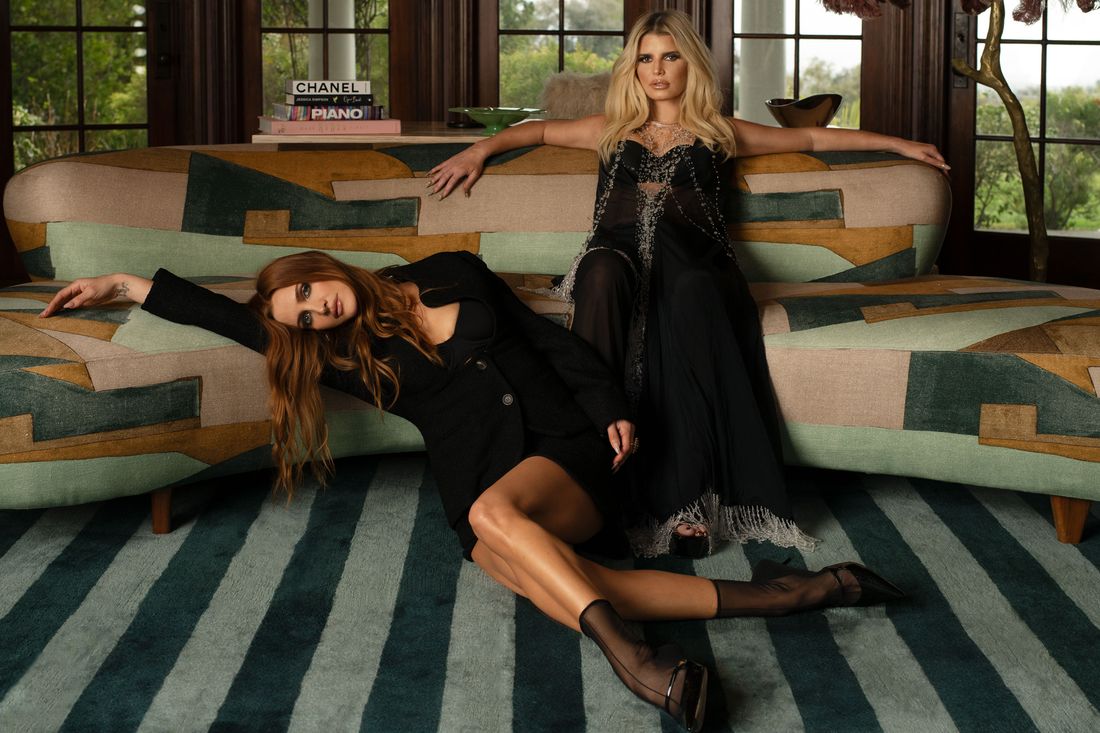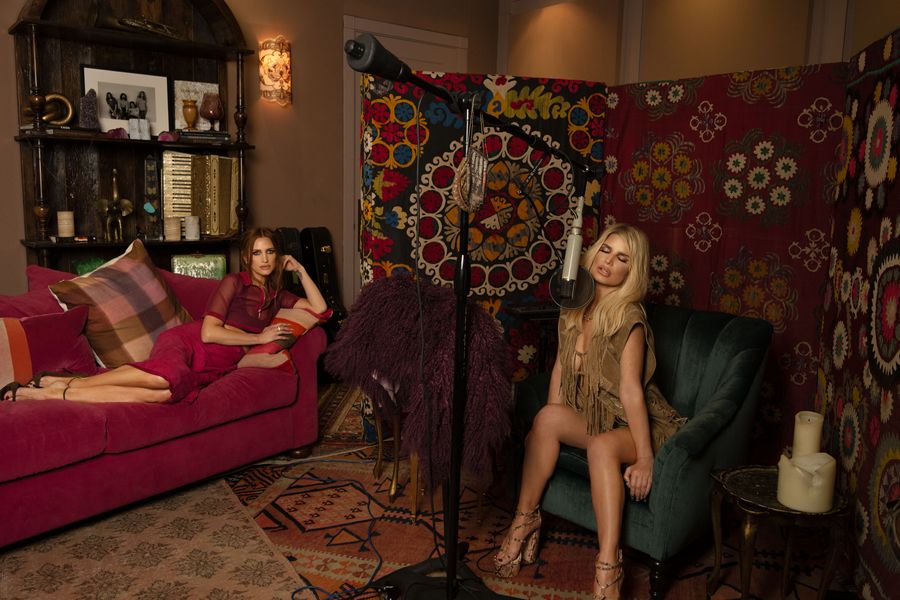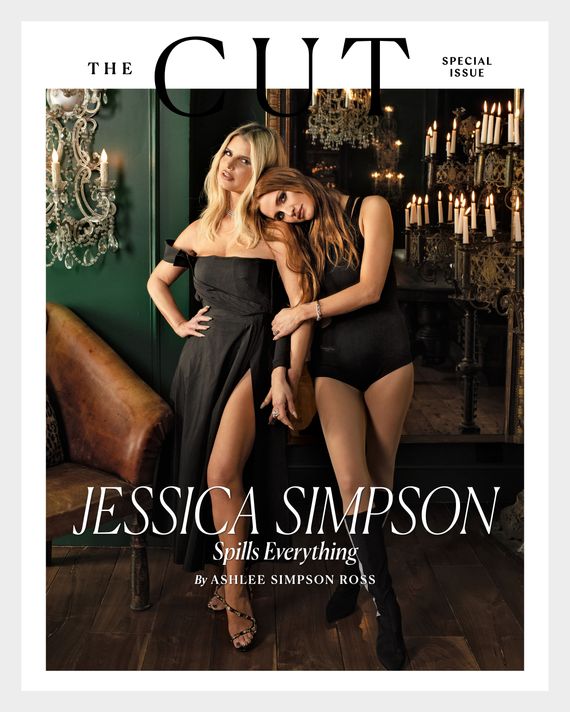
This cover story was originally published on February 20, 2025, as part of our Spring 2025 Fashion Issue. We’re recirculating it now that Jessica Simpson’s new single, “Use My Heart Against Me,” is available to stream.
Jessica Simpson and Ashlee Simpson Ross are different women today than the ones smiling above the headline “Sister Power!” on their first magazine cover together, for Teen People’s December 2005 issue. In the two decades since, the sisters, now in their 40s, have each had three children and a couple marriages (famously gaining, in Ashlee’s case, Diana Ross as a mother-in-law) and released even more music; Jessica built her eponymous clothing and shoe label, too. Then, in 2020, Jessica’s memoir, Open Book — in which she candidly discusses her struggles with alcoholism, body image, and surviving fame in the pop-stars-with-purity-rings era — became a best seller. Jessica now finds herself on a new path, one with fewer compromises and more country rock, with the release of an emotional EP, Nashville Canyon Part 1, which includes songs written amid the dissolution of her decadelong marriage to former NFL player Eric Johnson. “Through the deepest heartbreak of my life,” Jessica tells Ashlee at her eclectic jewel-tone-drenched Los Angeles home, filled with feathers, dogs, and memorabilia, “it was the most intense yet enlightening therapy I’ve ever been through.”
Ashlee Simpson Ross: Well, hello, Jessica Simpson. Or shall I say “Rajah”? I’ve always called you Rajah, from Aladdin.
Jessica Simpson: It was the only Nintendo game we played.
ASR: We loved that one. I was just laughing because the last time that we did a joint cover was Teen People. How do you think our lives have changed? Our marriages, breakups, children. I had a baby so early. But what a freaking journey we’ve had. Holy moly. I feel like I’ve changed a lot. What about you?
JS: You and I both. Oh my gosh, 25 years old. I was in a newfound freedom because I was going through a divorce. I was becoming myself all over again.
ASR: We stayed close to each other through these transitions. It’s almost funny, because we’ve been through so many of those.
JS: We stayed close as a family, no matter our parents going through a divorce, no matter all of our divorces. I probably faked it until I made it way more than most. When I first got to Nashville to write my new record last year, I listened to CeCe Winans over and over — “I Surrender All.” Her version still gives me chills because I was there to surrender all. I discovered so much that wasn’t true about the life I was leading that led me to shed everything all over again. Here I am again like I was at 25, out here floating around in the atmosphere on my own, but I know I’ve got my own back and it’s all in God’s hands when we surrender everything. That is our upbringing. Our faith is what always leads us back to our strength, for sure.
ASR: I’m so excited to be talking to you about this journey that you’ve been on. Tell me about Nashville Canyon. How did this all start?
JS: It really all began by going backward and making a playlist of stuff that I would listen to and that would hit me in different places than a little ditty that would be a hit.
The music releases from my younger years were all over the place in terms of actual direction. It was always about following pop-music trends no matter the cost. Even if I didn’t love what I was singing, it was what the label needed of me. I was always going to abide by the rules because I was taught to be a rule-abider. I wish I could have broken the rules more, like you.
ASR: You loved the rules. I’ve never cared about the rules.
JS: You were the cool one. I was doing what other people were telling me to do because it was radio friendly and it was the only way that my name would be heard.
ASR: When I listen to Nashville Canyon, I hear an Americana, rockabilly, timeless, old-school, classic vibe. You worked with a live band.
JS: Dad said to me the other day, “Honey, since when did you start liking that rock music?” I was watching documentaries on the Delta blues, on the beginnings of music. What about these songs makes them timeless? It’s about the instruments, not the computer. It’s about the simplicity of the story. I don’t think that I would’ve had the courage to do it this way if people weren’t as receptive as they were to my words in Open Book.
Making this record wasn’t about having a hit. It was just about having a vibe. There’s really not a lot of that in L.A. right now. It’s formulaic. I wanted to break that mold for myself personally. I don’t care if anything’s a hit. I’m not with a record label. I don’t expect it to even be on the radio. I appreciate that you realize how deeply rooted, in unexpected ways, this project is for me to set myself apart from old versions of myself. It’s not like it’s not me singing.
ASR: We like the old versions too! But we grow and we change. I feel like this is the most you version.
JS: I came back to the beginning. People have so many versions of me in their head. It’s confusing! Oh, is that the girl who doesn’t know the difference between chicken and tuna?
ASR: I’ve loved that people know nothing about me.
JS: Well, Open Book did that for me. I had no expectations going in … I thought it’d come in at No. 15 or something. When I heard it was No. 1, I was like, What? People care that much? I was like, Wow, bravery pays off. And it gives you freedom.
ASR: You’ve really put yourself out there in ways that I don’t.
JS: I’ve only seen success in honesty. I feel like you got that with Newlyweds — you got us being honest on reality TV. I mean, we were some of the first to ever be on reality TV! You got to see a side of our personalities. We’re quirky and funky and weird and honest. We’re just ourselves, and we’re dorks. We’re real people.
ASR: We’re talking while you’re at your house in L.A. But you moved to Nashville to write the record. What brought you back to Nashville?
JS: Around 2016, ’17, I was writing out here in L.A. with some of the biggest hitmakers. I have songs from those times that I never released because they just didn’t feel like me. Every time I would write, I was a little afraid of myself. It was almost too much, especially because I was drinking at the time.
But once I gave up the alcohol, the fears just diminished. They went away. And it was so much easier for me to access myself artistically. I’d thought the more I drank, the more cool I could be and find cool words that would rhyme, that wouldn’t be so expected. I overthought it when I drank.
When I took alcohol out of it, it became something that wasn’t so “Woe is me.” It became more empowering. I started pulling out my old journals, which eventually became Open Book. I now realize the power of words put to music. I would never have found that here in L.A. because there’s way too many distractions. As mothers, we’re people pleasers. We want to make sure everybody’s happy, nobody’s crying. We come last here in L.A. I needed to go somewhere where I was first. Not that I didn’t think of my children.
ASR: We both have three kids. How does it feel now that your kids are older and let you go to Nashville for that bit of time for yourself to actually create? I feel sometimes it is nice to separate yourself from motherhood for a second, to ask yourself, Who am I?
JS: It is a gift. Eric supported that gift. My kids supported that gift. We were out in Nashville for Maxwell’s 11th birthday, and she’s 12 now. I don’t know why she wanted to go to Nashville for her birthday other than she loves horses. Instead of singing “Happy Birthday,” she wanted me to play Hank Williams’s “I Saw the Light” when she woke up. I was having all these flashbacks of making my first record at 14, which was a gospel record, there. I was having flashbacks of writing In This Skin, writing “With You,” some of my songs that reflect me more than other stuff. I’m playing “I Saw the Light” instead of “Happy Birthday” to my 11-year-old daughter. And all of a sudden, I saw the light: I had to be in Nashville. I started looking at real estate that day.
ASR: I find it so brave. God, I just turned 40. It’s like, Wait, is my life over? No, it’s just beginning.
JS: When you say you’re 40, it really makes me feel old. By the time you turn 40, if you’re still listening to what other people are telling you, you shouldn’t be in the position to be making a record. By the time you turn 40, you’re a woman. You need to know your place in this world — whether it’s onstage, whether it’s being a songwriter. We’ve always been so creative, and our creative outlets have always been writing. You’ve always been such an honest writer, and you don’t care if it causes commotion. I had a brand to protect; I had reputations to protect.
If my younger self was about to promote a new album, I would have 40 interviews lined up; I would be flying everywhere. I would be exhausting myself — and all for a song that somebody else had written that is supposed to be representing who I am as an artist. It’s wild to me that I did that for so many years.
ASR: When we were new moms, you couldn’t even walk out the door without having to hide.
JS: Another great thing about Nashville is there’s no paparazzi. I literally was doing cartwheels down the Walmart aisles.
ASR: Isn’t that the best? Like, Hey, I’m a human!
JS: I was like, Being in CVS right now is so dope. Look at all these new little Vaselines!
ASR: I always love to go to your closet or your bathroom. It’s, like, 500 million products. My kids love nothing more than to go into your pantry because you have every treat on the planet. You really do love that CVS, Walmart, whatever.
JS: I’m your all-American girl when it comes to that, that’s for sure.
ASR: You love to save memories. I would say you’re not a hoarder; you’re a collector, okay?
JS: Yeah. I got over the hoarder part when I was like, This is ridiculous. There’s a million white tank tops here. Not every single one has to have its own story.
ASR: Let’s go back to you when you were signed. We’re in the ’90s. I was at the School of American Ballet.
JS: You dyed your hair with Kool-Aid.
ASR: I had braces, and I was just a little ballerina. You and Dad came to New York; you got signed. People were dicks back then. It was like, “You should be skinny; you should look like this; you should sound like this person.” I saw so much of that, and I was like, Oh no, fuck that. I’m never going to be that.
JS: You knew yourself from the beginning.
ASR: Only because I watched you going through it.
JS: Yeah, you watched me going through it — you watched me getting booed onstage.
ASR: Hey, I’ve been there too.
JS: You were watching the faces of people, and you were like, Wait a second — this is my dream, but I’m going to do it my way. I see Jessica having to do it their way, and there’s no backing out of that for her.
ASR: There were just so many men.
JS: In suits.
ASR: Telling you what you’re supposed to be or who you’re supposed to be when having this conversation across town.
JS: I had to be a pop star because I signed on to be a pop star. No matter what, there was never going to be enough sales, there was never going to be recouping, because they would put so much into me trying to win. You’re a by-product of this company that’s making them money. I didn’t realize that until I was dropped in 2008 or ’09 by my country-music label with my first No. 1 country album. My country record was written in Nashville, and that’s where I felt very much myself. All of a sudden, there were these 360 deals and I wouldn’t sign. That was the first time I stood up for myself. But I was always defined by having a record deal. I had a record deal since I was 14 years old, so to be at the age of 28, 29 not having a record deal, I didn’t know where I was or what I was or who I was, and I didn’t know who I was working for. It took me a while to realize that I deserved to work for myself.
ASR: If you could give me one symbol, because we’re symbol people, what is your symbol of this EP?
JS: My symbol for this record would be an owl. At this house, we had this owl that would show up in times when I really needed it the most, when I felt like my heart was sliced in half. It would be there through thunderstorms, lightning, just sitting there, waiting on us to arrive, to come home. It was so strange. I ended up giving it the name Prince, because me and Prince, back in the day, we would get into spiritual conversations. One time during this Grammys party, I went to his house and he was kind of waiting for me. The door opens and he’s standing there. He’s like, “Ms. Jessica?” And I’m like, “Yeah, Mr. Prince?”
He took me by the hand and said, “I want to show you something.” People are walking around with their Grammys, their accolades, and he had just released Musicology. He couldn’t stand where music was, and he wanted to school people on where music should be. He walks me to his mantel, and he’s like, “Do you notice anything?” I look up and there’s one thing on his mantel, and it was a cutout picture of just my smile framed. I was like, “Is that my smile?”
He was like, “Yes, and I want you to look very closely at that smile and know that no matter how many talks we have about being Jehovah’s Witness or nondenominational or Baptist or whatever it is, God is in that smile. Don’t let any man ever take that smile away from you, and do not let this music business take that smile away from you.”
ASR: Well, gosh, Jess. I remember my first dance being to “How Come U Don’t Call Me Anymore.”
JS: I know, I thought about that. And so I put Prince on the mantel of my house in Nashville, this dope black-and-white photo that was him in his element. Just to remember the importance of my smile through whatever it is that I am going through, wherever it is I’m leading myself through, that I am my own guide. And then I think of Stevie Nicks and the photos of her holding an owl.
ASR: Between Stevie Nicks and Lauryn Hill, that’s like heaven to me.
JS: Lauryn Hill for both of us — I mean, Sister Act 2, come on. Everything! That was probably musically what we connected over the most. We connected over India Arie. She was always ahead of the curve, always a straight shooter from the soul. When you listen to music, you know when somebody is locked in. And we loved the Romeo + Juliet soundtrack, could not get enough of it. I had a New Kids on the Block poster, while you had an Alanis Morissette poster. I was always boy crazy.
ASR: Should we collaborate again? We’ve had Christmas collaborations: “The Little Drummer Boy,” and when we did “War Is Over,” that was so much fun. When we are singing together, what band do we say we sound like?
JS: Heart.
ASR: Heart. Because we are from the same family, our tones —
JS: Our tones really vibrate well together. There’s definitely a world where there could be a Jessica and Ashlee record, for sure. We have always wanted to collaborate. It’s just about our worlds colliding and the timing being right. Maybe after you come to Nashville.
ASR: We definitely need to at least write a song for the people. Because we come from the same place. And you know me — I always want to sing with you. I also need a Nashville trip, so take me.
JS: I want to go too. I feel like I’ve been home too long. My L.A. house is on the market. I don’t know where I’m going next, but it’s time to go.
ASR: Everything happens for a reason, and we find ourselves. At least we’re aware of it and we see the light in the dark and we love each other.
JS: Yep. And we always need an owl standing by.



